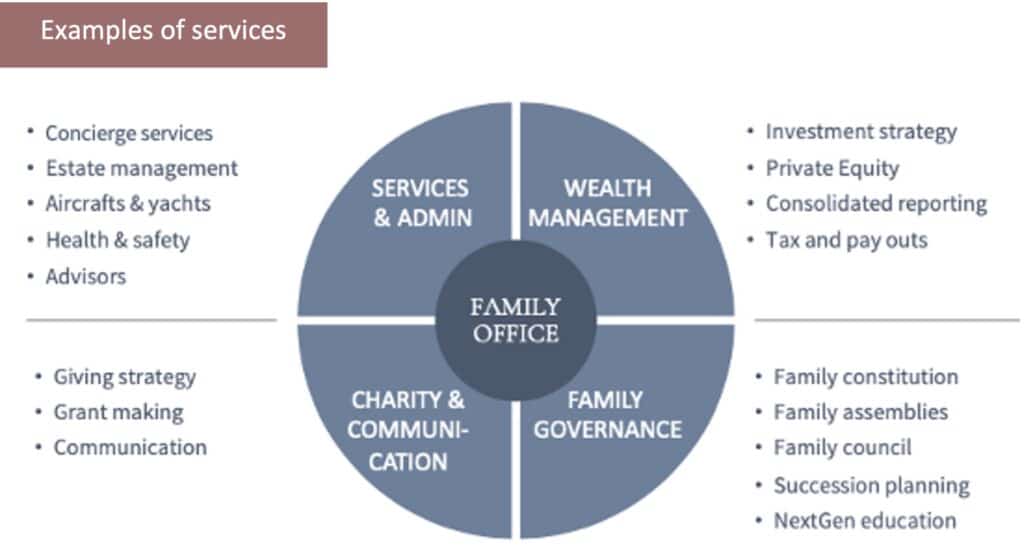What do they actually do – and why are they becoming increasingly popular?
A Family Office is a private company that manages the wealth and private affairs of one or more wealthy families. There are primarily two types: Single Family Offices and Multi Family Offices.

Family Office: A DIY solution offering more control and based on own values
In Denmark, there is no official list of the number of family offices, but it is estimated within the industry that there are approximately 60 larger or smaller family offices. This represents about a 50% growth over the past 5 years, with the number still increasing. More and more wealthy families are choosing to establish their own family offices as their wealth grows. There is a tendency for families to prefer a “do-it-yourself” approach rather than leaving wealth management to banks and other financial institutions. This DIY approach gives families more control and allows them to tailor investments and other financial activities to their unique needs and values.
Internationally, Family Offices have become a “hot” trend over the past 10-15 years. According to Forbes (August 2024), there are around 8,000 Family Offices worldwide today. Many wealthy families, successful entrepreneurs, and sports stars increasingly desire to have their own Family Office. As fortunes grow and the complexity of wealth management increases, families seek solutions that provide greater autonomy and the ability to maintain their financial and personal values across generations.
No ‘One Size Fits All’: Family Offices are as unique as the families behind them
There are as many different types of family offices as there are families behind them. A family office can take many forms depending on the family’s needs and desires. There is no “one size fits all” solution, and it is precisely this flexibility that makes family offices so attractive.
For example, a family office may emerge when the company’s CFO gradually transitions into a role as CEO of the family’s family office. In other cases, a sibling or other trusted family member may take on the responsibility of building and leading the family office structure. Regardless of who leads the family office, the goal is typically to secure the family’s wealth and values across generations.
Trends in Family Offices: From wealth management to a more holistic approach
While many family offices start with the primary goal of managing the family’s wealth, they often evolve to encompass much more. A family office can offer a wide range of services, from impact and philanthropic activities, real estate management, family legacy and education of the next generation, to more personal services like concierge services.
One of the strong trends is increased transparency and communication about the activities within the family’s portfolio of businesses and charitable activities. In today’s digital world, it is easy to “track” connections between families, businesses, investments, charitable activities, and media coverage. Abroad, there is talk of family offices increasingly having to manage ‘Total Family Capital’ or total wealth. Here, “wealth” refers not only to traditional financial assets but also to a broader understanding of what a family possesses and can achieve, including three types of capital:
- Reputational Capital: A family’s reputation is an invaluable resource that can open doors and create opportunities. A strong reputation can enhance both the business’s and the family’s position in society, attract partners, and build trust with customers and investors.
- Human and Intellectual Capital: The skills, knowledge, and experiences possessed by family members constitute an essential part of the family’s wealth. This form of capital enables the family to run their business effectively, innovate, and develop new ideas. Intellectual capital refers to the family’s collective knowledge and ability to make informed decisions that can lead to success.
- Social Capital: The family’s network and relationships with others – both within and outside the business – can create collaboration opportunities, support, and resources. These relationships contribute to the family’s overall wealth by strengthening their position in both the business world and society.
The Importance of the Ecosystem: When a family integrates these different forms of capital they create a family ecosystem. This ecosystem has a significant capacity to impact not only the business’s success but also the family’s overall well-being and their ability to contribute positively to society as a whole. By leveraging this broader wealth, the family can create lasting value that extends far beyond their financial wealth.
This holistic approach to wealth means that the family not only focuses on economic growth but also on developing and protecting the other forms of capital that enable them to have a lasting and positive impact on both their business, their family, and society as a whole.
Is a Family Office Right for You and What Wealth Is Required?
Family Offices play a central role in wealth management for many wealthy families, both in Denmark and internationally. Whether the focus is on investments, impact and philanthropy, real estate management, or other services, each Family Office is tailored to meet the family’s unique needs. With the increasing complexity of wealth management and the next generation’s desire to create a positive impact, Family Offices are becoming ever more relevant.
The costs of establishing and operating a Family Office vary according to purpose and services. According to Danish and international experts, the minimum amount required ranges from 100 million to several billion kroner, depending on the family’s needs.

We are happy to share our experience from both Denmark and abroad with the setup, management, and development of a Family Office. Please feel free to contact us for a non-binding and confidential conversation on the topic.
Sources: IMD, Carsten Steno, Forbes, UBS, Ejerskabskompagniet
Written by: Managing Director Christina Højfeldt & International Director Lise Møller
